I don’t know about you, but the wild swings in the stock market and all this talk about tariffs have me on edge. It’s like watching a scary movie where you’re not sure what’s coming next!
According to Greg McBride, CFA, Bankrate Chief Financial Analyst An alarming percentage of Americans tapped their emergency savings in the past year for monthly bills and day-to-day expenses, indicating possible variability of household income or potential strain on household budgets.
So here’s the thing: just like we take care of our bodies with exercise or our minds with a good book or meditation, our financial health needs attention and love too. If you’re new to managing money, don’t worry—this doesn’t have to be complicated.
Think of it as starting a new hobby, like learning to cook or picking up yoga. Your financial health is a big part of your overall well-being, and with a few simple steps and some awesome Oregon resources you can feel more in control. Let’s dive into why this matters, how to get started, and where to find help.
Why Your Financial Health Is a Big Deal
Your money affects pretty much everything—your stress levels, your plans, even your sleep! Ever lay awake worrying about bills? You’re not alone. A 2024 study found that over 60% of Americans stress about money, and it can mess with your relationships and health. It can also keep you from getting medical attention you may need.
So when you get a handle on your finances—think budgeting, saving a bit, or having a plan—it’s like a weight lifts off your shoulders. You don’t need to be a finance guru to make this work. Just like you don’t need to be a gym rat to stay fit, small, steady habits can make a huge difference.
Important Statistics About Women & Money
-
A 2023 U.S. Fidelity Women & Investing Study reported that only 33% of women feel confident in their ability to make investment decisions, compared to 52% of men. However, 61% of women who invest report achieving slightly higher returns than men, suggesting that when women engage in financial management, they can excel.
-
A 2024 Ellevest survey noted that 74% of women want to take control of their finances but feel overwhelmed by financial jargon, underscoring the need for accessible financial education.
-
The U.S. Bureau of Labor Statistics (2024) reports that 57.4% of women participate in the labor force, compared to 69.2% of men, but women earn 82 cents for every dollar earned by men (median weekly earnings: $1,005 vs. $1,225). This pay gap limits women’s ability to save and invest.
-
The Pennsylvania Coalition Against Domestic Violence (PCADV) reports a slightly lower but still significant figure, stating that financial abuse occurs in 98% of abusive relationships and is the number one reason victims stay in or return to abusive relationships.
-
A 2024 Verywell Mind article notes that estimates of economic abuse (a broader term including financial abuse) in the U.S. range from 52% to 98%, with financial abuse often being the first sign of dating violence or domestic abuse.
Easy Ways to Kickstart Your Financial Journey
-
Take a Quick Money Check-Up: Grab a coffee, sit down, and list out what you earn, spend, owe, and save. It can be really eye-opening! There are some apps like Mint or YNAB (You Need A Budget) that are meant to make this super easy. I have not used either, please let me know if you have a favorite money app.
-
Dream Big: Think about what you can live without now, and start saving whatever you can.
-
Learn as You Go: Check out the resources below—podcasts, books, and more—to learn a little more about budgeting and investing.
-
Don’t Go It Alone: Oregon has tons of free or affordable help, see below.
- Make Your Emergency Fund A Priority: An emergency fund/rainy day fund is so important. I’m sure most of my readers are already trying to squirrel away money for this, but in case you haven’t started, here is a gentle reminder to do so. Bankrate’s 2025 Emergency Savings Report notes that among those who used emergency savings in the past year, 26% withdrew $1,000–$2,499, 22% withdrew $500–$999, 18% withdrew less than $500, 14% withdrew $2,500–$4,999, and 15% withdrew $5,000 or more.
Oregon Resources to Boost Your Money Game
Living in Oregon? You’re in luck—there are some great local resources to help you get started:
-
Metropolitan Family Service: Offers help and support to move people beyond the limitations of poverty, inequity, and social isolation. One example is a program called Cash Oregon, which provides low to moderate income working families and individuals free, high-quality tax preparation and culturally responsive outreach to communities likely to face barriers to accessing tax credits.
With over a dozen free volunteer tax sites in the Portland and Eugene metropolitan areas as well as virtual tax preparation services, CASH Oregon provides thousands of families from every community and background with the tools needed to navigate the complexities of tax filing and significantly increase their refunds each year by accessing life-stabilizing tax credits, such as the Earned Income Tax Credit.
MFS also helps students build assets by offering Financial Reality Fairs, Career Exploration and Internships and helps individuals access auto and bike loans for clean transportation coupled with financial coaching. Their services help community members avoid financial missteps and build a secure financial future. So amazing!
-
OnPoint Community Credit Union: This local gem offers community education and tools. Through their digital learning platform Enrich, and financial counseling partnership with GreenPath, individuals can access their our team of certified financial educators, members, and they empower the broader community to live financially healthy lives.
Podcasts to Make Money Talk Fun
Podcasts are like having a smart friend explain money stuff while you’re driving or doing dishes. I listen to these two podcasts while I’m gardening. I also try to listen to them while driving my daughter around, but she quickly switches to her favorite album.
-
Financial Feminist: Tori Dunlap makes finance feel like a chat with your bestie. She covers everything from budgeting to understanding tariffs, with episodes like “Navigating Market Chaos: A Beginner’s Guide to Volatility” that hit home right now. Find it on Spotify or Apple Podcasts.
-
Odd Lots: Bloomberg’s Joe Weisenthal and Tracy Alloway break down big topics like the stock market in a way that doesn’t make your eyes glaze over. It’s great for getting the “why” behind the news. Available on Spotify or Apple Podcasts.
Swing by Powell’s for These Money Books
If you’re in Portland, you’ve gotta visit Powell’s Books—it’s like a candy store for book lovers! Their personal finance section is packed with beginner-friendly reads. Here are three to check out:
-
“The Simple Path to Wealth” by JL Collins: This is like a friendly guide to saving and investing without the jargon. Perfect if the stock market freaks you out.
-
“I Will Teach You to Be Rich” by Ramit Sethi: Ramit’s funny and down-to-earth, with tips on budgeting and investing that feel doable. The 2024 edition even tackles today’s economy.
-
“Get a Financial Life” by Beth Kobliner: Great for young adults or anyone starting out, this covers budgeting, debt, and more in simple steps.
The links above will take you to Powells online, or you can head to Powell’s at 1005 W Burnside St, Portland. They often host financial workshops too, so keep an eye on their events page.
TED Talks to Get You Pumped About Money
Need a quick dose of inspiration? These TED Talks are short, sweet, and perfect for beginners. Watch them on ted.com or YouTube:
-
“How to Take Charge of Your Money” by Wendy De La Rosa (2021): Wendy shares easy tricks. It’s like a pep talk for your wallet.
-
“Six Ways to Improve Your Relationship with Money” by Thasunda Brown Duckett (2023): Thasunda is amazing! Love her straightforward approach to getting people to think and talk about money.
Financial Advisors in Portland
Sometimes, you want a pro to guide you, especially when markets are shaky. A good advisor is like a coach—they’ll guide you without making it feel overwhelming. I am still trying to find “my perfect advisor.” If any of my readers have money managers they love, let us know on Instagram at @pdxwellnessguide.
Financial Freedom
Remember, you don’t need to be a money wizard to make progress. Start by tuning into Financial Feminist or Odd Lots, swinging by Powell’s for a book, or booking a free workshop with CASH Oregon. If you want personalized help. At this point I don’t feel comfortable recommending a money management advisor, but I do ask you, my reader, to share yours (if you love them and they’ve done well by you) and tag @pdxwellnessguide on instagram.
In a world of market chaos and economic uncertainty, taking charge of your money feels like a superpower. So, what’s your first step gonna be?
Disclaimer: Always consult a financial advisor before making investment decisions. The resources listed are for educational purposes and may not suit everyone’s needs.





